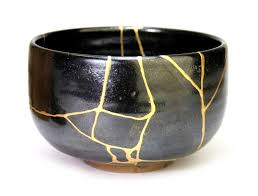It Isn't About the Rupture but Rather the Repair
Opportunities for personal development, especially in the area of relationships AND challenging all-or-nothing thinking, are not always pleasant. As a matter of fact, they invoke many uncomfortable thoughts and feelings for me. Recently, though, I was able to face that discomfort head-on. I wanted to talk about it because it was a telephone pole not directly related to trauma therapy but imperative to brave through so that my therapy has an effective working relationship. That working relationship is necessary for healing.
A few days ago I had a rather unpleasant experience sitting on the couch in my therapist's office. The discussion itself was thought-provoking as we were discussing boundaries. I recognize that some of my boundaries are effortlessly fixed while others do not exist at all. Boundaries are frightening to me because feeling out of control causes a considerable amount of distress, and a broken boundary causes me to feel out of control.
While discussing setting a particular boundary with someone, I began to self-reflect. I wanted to think about times I had healthily set boundaries. For some reason, my mind went to a time I set a boundary and allowed a person to put one toe over the line. That is where the saying, "If you give them an inch, they will take a mile" comes from. The memory of when the person took a mile suddenly was happening in real-time. I could not escape. Truthfully, I could not escape for the rest of the day. I would have a flashback, be somewhat present and aware but unable to figure out if I was in that place or my own home, or I would be thinking of and acting on ways to stop the flood of thoughts, sensations, and feelings (healthy and unhealthy self-regulation techniques).
Early on I recognized a concerning amount of distress in myself. I felt overwhelmed and wanted that feeling to be eradicated as quickly as possible. I NEEDED to reach out for help. I did reach out, but I was disappointed, and later, hurt and ashamed. I was terrified and feeling hopeless (and maybe even helpless). My initial understanding of the situation and solution further induced feelings of shame and powerlessness.
My relationship with my therapist was suffering from a fracture or rupture. The thing is, I could choose to no longer trust my therapist because MY needs were not met the way I wanted and needed them to be. I could approach therapy with extreme and detrimental caution, never truly letting down my guard as I have with other people. OR, I could choose to move toward the discomfort. I sat on that same couch that I had a few days before, this time to discuss "the rupture." It was indeed a telephone pole opportunity for me.
Getting to this telephone pole felt like I was climbing a hill with a 60% grade. Just for reference, telephone poles in my area are approximately 100 meters apart. That does not seem so bad even when running hills, but a 60% grade is like climbing a set of stairs without the convenient, evenly spaced, flat steps. A therapist worth their salt will not ask you to sprint that hill (but your soccer coach in college will make you do 10 hill repeats with a punishment of 2 more if your designated half of the team does not finish first). Fortunately, my therapist is not my college soccer coach. There is no sprinting up the hill. There is no repeating that torture ten times. There is no punishment if I don't do it more efficiently or faster than someone else would.
She uses a phrase that is probably not original to her but sums up our working relationship. "It isn't about the rupture but rather the repair."
Repair requires a reciprocal understanding. Understanding requires open and honest communication. Open and honest communication requires trust. If I did not trust her, I would not have launched myself into the discomfort. I have noticed that the few times I have launched myself headlong into discomfort, I have come out with a stronger relationship and mutual understanding. Repairs make relationships stronger, among other things.
My encouragement to myself and others is this: If there is a rupture, do not run unless the rupture occurred in a relationship that needed to end. Take a step back, determine how important that relationship is, and step into the discomfort. If repair does not happen, it will be okay. If it does, the relationship (with your spouse, child, friend, acquaintance, employer or employee, therapist, etc.) will be like the Japanese Kintsugi pottery. When a ceramic pot is broken, it is repaired with gold. Not only is it whole again, it is also stronger and more magnificent than before. I am working to make ALL of my relationship like Kintsugi pottery. Give it a try.



Comments
Post a Comment